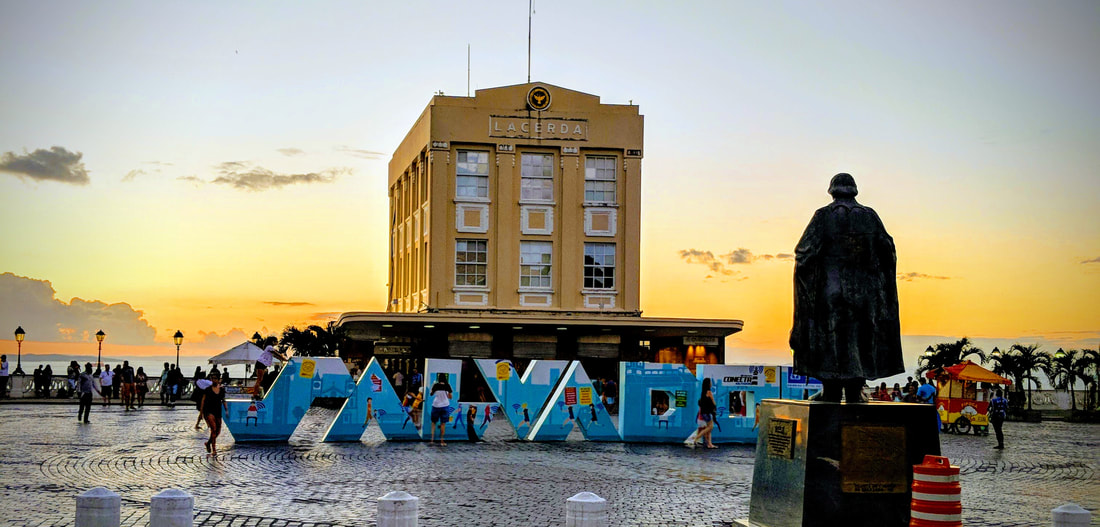|
By Carter Potthoff and Morgan Van Beck After a missed flight and 24 hours in Chicago, we were more than happy to finally land in Salvador and settle in. On the way to the hotel in the middle of rush hour traffic, we saw a massive building with the words “Jesus Cristo é o senhor” and a huge logo reading “Universal”; it was one of the Protestant churches that have exploded in popularity in Brazil in the past few decades. Being the future social scientists that we are, we both instantly knew that we needed to investigate further and decided to use our first blog post for this trip to dive deeper into religion in Brazil and reflect on our experiences with religion here in Bahia thus far. The religious dynamic of Bahia is super interesting because it not only includes the rapidly growing Protestant movements, but is also the birthplace of Candomblé, one of the most practiced Afro Brazilian religions. Our brief introduction to Candomblé included a lecture by Professor Willys Santos, who is a scholar on Brazilian religions at UFBA and also a Candomblé priest as well as a lecture and visit to a terreiro, a place in which Candomblé is practiced, by and alongside Alcides, another Candomblé priest or Pai de Santo. These have been our favorite lectures thus far. We learned that Candomblé is not just a religion, but a way of life. Followers of Candomblé focus on their connection with their own self, their communities, and nature, and they connect with these things via their orixás, or the spirits that are with someone from birth until after death. Pai Alcides talked about the important role of women in Candomblé, which is a matriarchal religion, because female slaves from Africa were the ones who kept the African roots of Candomblé alive. He also talked to us about the role Candomblé has in its followers lives and how followers engage with the religion. He explained that the terreiro created a space for family that was taken away by the slave trade. It is a place for community and gathering. He also explained that followers of Candomblé go to priests based on their needs, whether physical, emotional, relationship, social/economic, etc. Based on that, the Pai de Santo then provides direction to help us better understand ourselves and what we need in order to resolve the issue. Pai Alcides said “O Candomblé vai equilibrar, não curar” or “Candomblé will balance, not cure”. This line, for us, is what Candomblé is all about; seeking balance within one’s life in order to progress forward. Learning about Candomblé here in Brazil has also helped us to retroactively better understand some of the material that we read in class, specifically, the book Crooked Plow by Itamar Vieira Junior. This book gave us a lot of insight into the dynamics of race, gender, and inequality in Brazil. It also centered on Afro Brazilian religion, which we were very unfamiliar with. Specifically, Jarê, which was practiced by the family that the book centered on. Zeca was a Jarê healer, but before coming to Brazil, we couldn’t fully understand what his role in the community really was (Vieira Junior 2019). Our time with Professor Willys Santos and Pai Alcides taught us the principles of Candomblé and other Afro Brazilian religions in an approachable way that made us appreciate Crooked Plow so much more. As two students from Stearns County, we both really enjoyed diving into Candomblé. It’s something that we would never have had the chance to experience back home. Something that we are a little more familiar with is Protestantism; although, we were not familiar with its role in Brazil before this class. In Professor Willys Santos’s lecture, he talked about how Protestantism and Candomblé interact in Brazil. He explained that Afro Brazilian religions have historically been targeted and suppressed by those in power, who have historically been Catholic and are now increasingly Protestant. This tied into part of the lecture that Flavia Biroli gave at the CSBSJU Multicultural Center. She discussed the ways in which Protestantism is exploding in Brazil, its tie to conservative movements, and its effect on the decline of Catholicism. We also read about the changing religious dynamics of Brazil in Pereira’s Modern Brazil: A Very Short Introduction and discussed it with Karine Belarmino, a PhD student who researches clientelism within Brazilian Protestant movements. Karine explained that these Protestant denominations are gaining strength by providing services in communities that lack them, which makes adherents flock to their congregations, thus “buying” their votes in exchange for these services (Belarmino). This has culminated in a strong Brazilian Protestant movement, both political and religious, which was reflected in the grandiose church that we saw on our drive home from the airport. An influx of congregants also means that Protestant churches are gaining political power. In addition to listening to Flavia Biroli’s lecture, we also read her 2016 article titled Political Violence Against Women in Brazil: Expressions and Definitions. In this article, Flavia discussed how a strong conservative movement and backlash is resulting in political violence against women, but she also discussed the role of Protestant churches in this conservative movement. Many prominent Protestants are gaining political power by winning the votes of the growing number of Protestants in Brazil. These politicians, who are sometimes pastors, campaign on platforms of Protestant values, such as traditional family and gender roles (Biroli 2016). These Protestant politicians are also able to promote policies that target non-Christians in Brazil, such as those who practice Candomblé, which brings us full circle back to Professor Willys Santos’s lecture on our first full day here. It has been a whirlwind first couple of days, but we are looking forward to everything else that Brazil has in store for us! Photos from a shrine to one of the Candomblé orixás, Yemanjá, in Salvador, Brazil. Sources: Belarmino, Karine. “Clients of God: Introduction.” Ph.D. Dissertation. University of Minnesota. Forthcoming. Biroli, Flávia. “Political Violence against Women in Brazil: Expressions and Definitions / Violência Política Contra as Mulheres No Brasil: Manifestações e Definições.” Revista Direito e Práxis 7, no. 15 (September 14, 2016). Pereira, Anthony. Modern Brazil a very short introduction. Oxford, United Kingdom: Oxford University Press, 2020. Vieira Junior, Itamar. Crooked Plow. Verso Books, 2019.  Carter Potthoff is a senior at Saint John's University, majoring in Hispanic Studies and Biology and minoring in Latino/Latin American Studies. He is originally from Sartell, MN. Some of his many research interests include indigenous groups, cultures, and religions in southern Mexico and Guatemala, immigration in the Americas, and racial dynamics in Latin America. In his free time, Carter loves trying out new recipes, spending time with his family and friends, and most people don't know this, but he is an avid birder! Carter is excited to visit Brazil for a second time and learn firsthand about race and gender!  Morgan Van Beck is a senior Political Science and Hispanic Studies double major with a minor in Latino/Latin American Studies. She is originally from Sartell, Minnesota. Morgan's most formative educational experience was traveling around Guatemala with the Guatemala Human Rights Commission, which inspired the theme of her senior distinguished thesis: human rights abuses in post-conflict societies. Morgan recently received a Fulbright grant to teach English in Colombia and will be moving there shortly after graduation.
0 Comments
Leave a Reply. |
Archives
June 2024
Categories
All
|




 RSS Feed
RSS Feed
